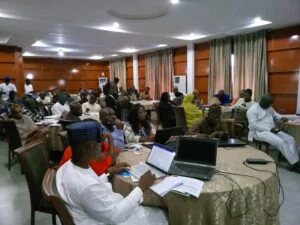Some stakeholders in the education sector have underscored the need to review the current basic education curriculum to promote life-long skills among Nigerians and boost social-economic growth of the country.
They expressed this at a stakeholders’ dialogue and high-level policy committee meeting on Thursday in Abuja.
The meeting was organised by the Nigerian Educational Research and Development Council (NERDC).
Dr Margret Lawani, the Acting Executive Secretary of the council, said that the current basic education curriculum was last reviewed in 2012 and introduced into the schools nationwide in 2014.
Against this backdrop, Lawani said that the current basic education curriculum could no longer meet current needs after 12 years of its development.
He, therefore, called for a review.
“The curriculum was designed to attain all the lofty values of social and economic development and reconstruction enshrined in the global and domestic initiative adopted by Nigeria.
“It aims at the acquisition of appropriate levels of literacy, numeracy, manipulative and life-long skills.
It is also targeted at the ethical, moral and civic values needed to lay the foundation for economic sustenance and value reorientation that will bring about human and national development.
“In line with best practices, school curricula are founded on clear structure and benchmarks that reflect the needs and aspirations of the society it is meant to serve.
“Thus, the extant curriculum was developed based on curriculum structure articulated by NERDC and adopted by critical stakeholders in the education and wider socioeconomic sectors in 2010.
“The structure specifically focused on achieving the vision and agenda of the National Economic Empowerment and Development Strategy (NEEDS), 2004, the MDGs and other crucial national policy frameworks,” she said.
According to her, since the introduction of the curriculum, the Nigerian society and the global community have witnessed dramatic changes with the emergence of a new world order and agenda driven by advancement in digital technology.
“The global society has also witnessed a speedy transition into the sixth wave of innovation dictated by the rise of Artificial Intelligence (AI) and Internet of Things (IoT), robots and drones, and clean technology.
“Furthermore, Nigeria has set new developmental policy agenda and milestones including strong commitment to achieve the 2030 education agenda as encapsulated in the Sustainable Development Goals (SDGs).
“We recognise that the curriculum is an outcome of the decisions of the people as to what knowledge, skills, values, and competencies students should learn in school for them to live and meaningfully contribute to the development and growth of society,” Lawani added.
She said that the meeting was one of the initiatives of the council aimed at collating the views and inputs of critical stakeholders towards the design of a qualitative curriculum for basic education in Nigeria.
Lawani further reiterated that the current curriculum review drive was aimed at designing a globally competitive competency and outcome-based curriculum that would take care of critical emerging issues.
She added that it would also provide the platform to instil the 21st century skills in the learners.
On his part, the Minister of Education, Prof. Tahir Mamman, said that one of the critical aspects of the current administration was to revamp the education sector towards creating a vibrant workforce.
Represented by the Minister of State for Education, Dr Tanko Sununu, Mamman stated that a lot was happening in the world and technology was on the line.
“It is either you join or you are left behind and the only foundation for us to join is to have curriculum that will give us opportunity to think critically and address our issues and also protect ourselves.
“We are committed to achieving this through this policy.
“The curriculum review is very important because we have to address our needs and we must go back to change our mode of teaching to improve the perception and understanding of our children.
“Right now, Nigeria is one of the countries that is greatly affected by learning crisis.
“Reports have shown that out of five children in the world, one of them is out of school and that one out of five is a Nigerian, this is not good news,” he said.
According to him, reports have also shown that out of four children in Nigeria, at least one of them suffers poor numeracy level, poor learning level and also poor critical thinking level.
“These are all factors that retard national development and we must be able to come together to address them.
“We have placed priority on curriculum review at all levels to make our education functional.
“Our vision in this regard is crest in the learning content of the school system towards breeding self-reliant citizens with requisite knowledge, skill and competitiveness to be able to perform and take their rightful place globally,” he said.(NAN)

























